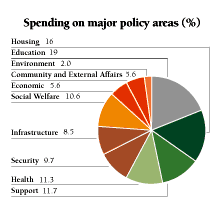|
1998/99 Budget
The 1998/99 Budget at a glance
| Total public expenditure |
$290,130 million
(US$37.2 billion) |
| Government expenditure |
$232,873 million
(US$29.9 billion) |
| Government revenue |
$205,122 million
(US$26.3 billion) |
| Consolidated deficit |
$36,500 million
(US$4.7 billion) |
| Fiscal reserves (at 31-3-99) |
$434 billion
(US$55.6 billion) |
Reform of the Securities
and Futures Markets
A major reform of the securities and futures markets was announced in the Budget
as part of ongoing efforts to maintain Hong Kong as the pre-eminent financial services
centre in East Asia and to strengthen Hong Kong's markets in the wake of the Asian
financial crisis.
Reforms will include the demutualisation and merger of the stock and futures exchanges
and a new regulatory framework to take into account such things as e-commerce, Internet
trading and around-the-clock global securities market networks.
Supervision of banks will be strengthened by developing a greater capability to identify
and quantify the risks faced by individual banks and to assess the quality of their
policies, procedures and controls in risk management; and developing a deeper debt
market, both locally and on a regional basis, to provide more stable and flexible
financing for businesses.
Following, speculative attacks on the Hong Kong Dollar in August 1998, Hong Kong's
monetary base was widened to reduce volatility in interest rates and to make the
monetary system more stable if there are sudden and large inflows or outflows of
capital.
Civil Service Reform
A major reform of the civil service was announced by the Financial Secretary in the
1999/2000 Budget.
The reforms include:
- A review of employment terms and conditions, including starting pay, allowances
and other benefits
- An overhaul of the appointment system to provide greater flexibility in the hiring
and firing of staff and to consider the introduction of performance-related pay increases
- Strengthening the result-oriented and service-based culture
- Maximising room for private sector involvement in the delivery of public services
- An Enhanced Productivity Programme to deliver productivity gains of 5% of operating
expenditure by 2002/03 (with gains of HK$800 million (US$103 million) expected in
1999/2000)
- A pay freeze for 1999
- Greater use of contract staff, and a freeeze on hiring permanent staff
Cyberport
The Cyberport project, announced in the Budget, is part of the government's efforts
to consolidate Hong Kong's position as the premier information and technology hub
in Asia.
The project is a joint development between the government and the company which proposed
the concept, the Pacific Century Group.
Cyberport will attract a cluster of companies involved in the development of advanced
IT applications and services, as well as multi-media and content creation such as
film production, 3-D graphics and animation. It will help Hong Kong develop a critical
mass of professional IT talent in the shortest possible time.
The HK$13 billion (US$1.6 billion) development on a 26-hectare site at Telegraph
Bay, Pok Fu Lam, on the western shores of Hong Kong Island will be commissioned in
phases starting from end-2001/early 2002.
Cyberport will include an ultra-modern intelligent building complex, state-of-the-art
broadband telecommunications and information 'backbone' and a wide range of shared
facilities such as a media laboratory, a cyber library, an interface with universities
and research institutes and a cyber mall.
Up-market residential accommodation, gardens, lakes and a marina will be included
to entice overseas talent to set up in Cyberport. Educational, recreational and entertainment
facilities are planned to ensure residents and visitors get a 'hands-on' feel of
what is happening in the digital domain.
Since the announcement of the project, 10 leading international IT companies including
Hewlett-Packard, IBM, Oracle and Yahoo! have signed up as anchor tenants and about
40 other companies have registered interest in becoming tenants.
 |
Last updated: June 1999 |
|

 |

